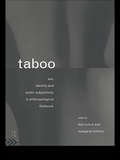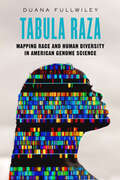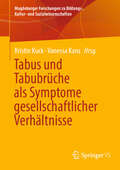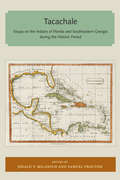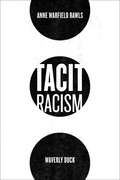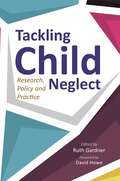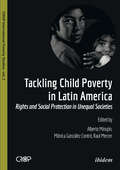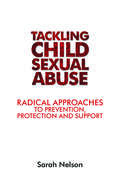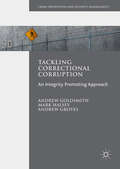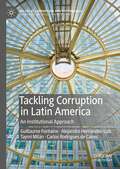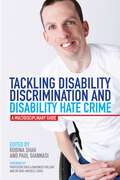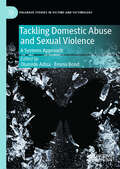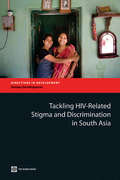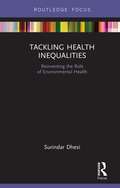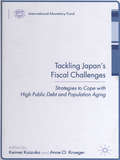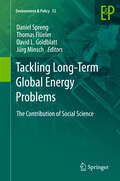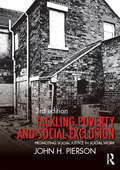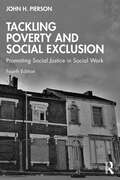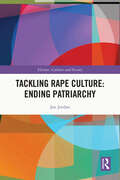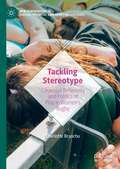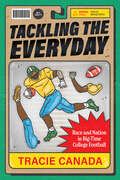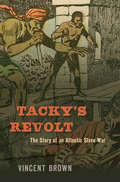- Table View
- List View
Taboo: Sex, Identity and Erotic Subjectivity in Anthropological Fieldwork
by Don Kulick Margaret WillsonTaboo looks at the ethnographer and sexuality in anthropological fieldwork and considers the many roles that sexuality plays in the anthropological production of knowledge and texts. How does the sexual identity that anthropologists have in their "home" society affect the kind of sexuality they are allowed to express in other cultures? How is the anthropologists' sexuality perceived by the people with whom he or she does research? How common is sexual violence and intimidation in the field and why is its existence virtually unmentioned in anthropology? These are but a few of the questions to be confronted, exploring from differing perspectives the depth of the influence this tabooed topic has on the entire practice and production of anthropology.A long-overdue text for all students and lecturers of anthropology, many post-fieldwork readers will find a resonance of issues they have previously faced (or tried to avoid) and those who are still to undertake fieldwork will find articles that refer to other kinds of personal and professional experience as well as providing invaluable preparations for coping in the field.
Taboo: Why Black Athletes Dominate Sports And Why We're Afraid To Talk About It
by Jon EntineDrawing on the latest scientific research, journalist Jon Entine makes an irrefutable case for black athletic superiority. We learn how scientists have used numerous, bogus scientific methods to prove that blacks were either more or less superior physically, and how racist scientists have often equated physical prowess with intellectual deficiency. Entine recalls the long, hard road to integration, both on the field and in society. And he shows why it isn't just being black that matters?it makes a huge difference as to where in Africa your ancestors are from.
Tabula Raza: Mapping Race and Human Diversity in American Genome Science (Atelier: Ethnographic Inquiry in the Twenty-First Century #14)
by Duana FullwileyDuana Fullwiley has penned an intimate chronicle of laboratory life in the genomic age. She presents many of the influential scientists at the forefront of genetics who have redefined how we practice medicine and law and understand ancestry in an era of big data and waning privacy. Exceedingly relatable and human, the scientists in these pages often struggle for visibility, teeter on the tightrope of inclusion, and work tirelessly to imprint the future. As they actively imagine a more equal and just world, they often find themselves ensnared in reproducing timeworn conceits of race and racism that can seed the same health disparities they hope to resolve. Nothing dynamic can live for long as a blank slate, an innocent tabula rasa. But how the blank slate of the once-raceless human genome became one of racial differences, in various forms of what Fullwiley calls the tabula raza, has a very specific and familiar history—one that has cycled through the ages in unexpected ways.
Tabus und Tabubrüche als Symptome gesellschaftlicher Verhältnisse (Magdeburger Forschungen zu Bildungs-, Kultur- und Sozialwissenschaften)
by Kristin Kuck Vanessa KanzDer Sammelband behandelt aus den Perspektiven der Kultur- und Gesellschaftswissenschaften das Phänomen Tabu und seine vielseitigen Ausprägungen schwerpunktmäßig in der zeitgenössischen europäischen Gesellschaft. Zwar entstammt das Konzept selbst den polynesischen Gesellschaften, die durch Seefahrer im 18. Jahrhundert entdeckt wurden, aber durch Missionsbewegungen in der Ferne, Romantisierungen in der Heimat und die europäische Aufklärung entwickelte sich ein ganz eigenes Tabukonzept in Europa, das bis heute starke sozial ordnende Effekte hat. Tabus legen fest, was von Mitgliedern einer Gruppe an Gedanken, Handlungen, Gefühlen und Themen zugelassen wird und was nicht, und gleichzeitig sind Tabubehauptungen und Tabubrüche auch Thematisierungsstrategien. Der Band folgt daher der These, dass Tabugrenzen nicht nur stetig ausgehandelt werden, sondern auch als soziale Konstrukte gesellschaftliche Verhältnisse wiederspiegeln. Enttabuisierungsbestrebungen, beispielsweise in Bezug auf psychische Krankheiten oder auf die Kommunikation von Gewalterfahrungen werden heutzutage oft mit Hochwertkonzepten wie Selbstbestimmung, Diversität und Gleichberechtigung legitimiert. Gleichzeitig verschärfen sich auch Tabugrenzen, wenn es z. B. um die Stigmatisierung von Diskriminierung geht. Veränderungen in den Tabugrenzen sind also nicht zufällig, sondern Ausdruck von gesellschaftlichen Verhältnissen und Entwicklungen. Die Beiträge werfen aus den verschiedenen Perspektiven verschiedener kultur- und gesellschaftswissenschaftlicher Fächer Schlaglichter auf Forschungen, die mit Tabus umgehen und umgehen müssen. Sie geben so einen Einblick in aktuelle Aushandlungen zwischen dem Tabuisierten und dem Nicht-(Mehr)-Tabuisierten.
Tacachale: Essays on the Indians of Florida and Southeastern Georgia during the Historic Period (Florida and the Caribbean Open Books Series)
by Jerald T. Milanich Samuel ProctorThe books in the Florida and the Caribbean Open Books Series demonstrate the University Press of Florida’s long history of publishing Latin American and Caribbean studies titles that connect in and through Florida, highlighting the connections between the Sunshine State and its neighboring islands. Books in this series show how early explorers found and settled Florida and the Caribbean. They tell the tales of early pioneers, both foreign and domestic. They examine topics critical to the area such as travel, migration, economic opportunity, and tourism. They look at the growth of Florida and the Caribbean and the attendant pressures on the environment, culture, urban development, and the movement of peoples, both forced and voluntary.The Florida and the Caribbean Open Books Series gathers the rich data available in these architectural, archaeological, cultural, and historical works, as well as the travelogues and naturalists’ sketches of the area prior to the twentieth century, making it accessible for scholars and the general public alike.The Florida and the Caribbean Open Books Series is made possible through a grant from the National Endowment for the Humanities and the Andrew W. Mellon Foundation, under the Humanities Open Books program.
Tacit Racism
by Waverly Duck Anne Warfield RawlsWe need to talk about racism before it destroys our democracy. And that conversation needs to start with an acknowledgement that racism is coded into even the most ordinary interactions. Every time we interact with another human being, we unconsciously draw on a set of expectations to guide us through the encounter. What many of us in the United States—especially white people—do not recognize is that centuries of institutional racism have inescapably molded those expectations. This leads us to act with implicit biases that can shape everything from how we greet our neighbors to whether we take a second look at a resume. This is tacit racism, and it is one of the most pernicious threats to our nation. In Tacit Racism, Anne Warfield Rawls and Waverly Duck illustrate the many ways in which racism is coded into the everyday social expectations of Americans, in what they call Interaction Orders of Race. They argue that these interactions can produce racial inequality, whether the people involved are aware of it or not, and that by overlooking tacit racism in favor of the fiction of a “color-blind” nation, we are harming not only our society’s most disadvantaged—but endangering the society itself. Ultimately, by exposing this legacy of racism in ordinary social interactions, Rawls and Duck hope to stop us from merely pretending we are a democratic society and show us how we can truly become one.
Tacit Subjects: Belonging and Same-Sex Desire Among Dominican Immigrant Men
by Carlos Ulises DecenaTacit Subjects is a pioneering analysis of how gay immigrant men of color negotiate race, sexuality, and power in their daily lives. Drawing on ethnographic research with Dominicans in New York City, Carlos Ulises Decena explains that while the men who shared their life stories with him may self-identify as gay, they are not the liberated figures of traditional gay migration narratives. Decena contends that in migrating to Washington Heights, a Dominican enclave in New York, these men moved from one site to another within an increasingly transnational Dominican society. Many of them migrated and survived through the resources of their families and broader communities. Explicit acknowledgment or discussion of their homosexuality might rupture these crucial social and familial bonds. Yet some of Decena's informants were sure that their sexuality was tacitly understood by their family members or others close to them. Analyzing their recollections about migration, settlement, masculinity, sex, and return trips to the Dominican Republic, Decena describes how the men at the center of Tacit Subjects contest, reproduce, and reformulate Dominican identity in New York. Their stories reveal how differences in class, race, and education shape their relations with fellow Dominicans. They also offer a view of "gay New York" that foregrounds the struggles for respect, belonging, and survival within a particular immigrant community.
Tackling Child Neglect: Research, Policy and Evidence-Based Practice
by Jan Mcallister Wendy Lee Andrew Turnell David Howe Leigh Taylor Sarah Gorin Hilary Kennedy Jane Barlow Jenny Woodman Amanda Bunn Debra Allnock Jan Horwath Katelyn M. Guastaferro Whitney R. Rostad John R. Lutzker Maeve Macdonald Paul Whalley Marian Brandon Dan Koziolek Ruth Gardner Pippa BeldersonWith contributions from internationally recognized experts, this edited volume presents original thinking on the theory, research and practice surrounding child neglect. Comprehensive and current, the book takes an expansive look at how we can better address this prevalent issue. It explores the effects of neglect on the developing child and makes recommendations on how to identify neglect at the earliest opportunity. It considers common causal and contributing factors in neglect cases and the impact of these on children. The book details effective intervention techniques alongside case vignettes and shows how change can be achieved. It highlights the importance of supporting parental care and developing parental responsibility in families where children are neglected. Chapters provide in-depth descriptive examples and include a summary of learning points. Including practical suggestions for combating child neglect, this is an essential guide to best practice for students and practitioners working with children and families. The book also contains useful insights relevant to researchers and policy makers.
Tackling Child Poverty in Latin America: Rights and Social Protection in Unequal Societies (CROP International Poverty Studies #2)
by Alberto Minujin Mónica González Contró Raul MercerThis book highlights current debates about concepts, methods, and policies related to poverty in Latin America. It focuses on child and adolescent well-being and the issue of inclusive societies. Its goal is to promote new and critical thinking about these issues globally and in Latin America. The authors emphasize the need to develop new conceptual and practical avenues that can address the issues of poverty, marginalization, exclusion, and old and new inequalities in post-neoliberal times. The objective is to advance the rights of all children and adolescents in the region. This urgent book represents a unique opportunity for practitioners, policy makers, researchers, and students to get access to the most up-to-date perspectives on child poverty and inequality from a conceptual and practical point of view.
Tackling Child Sexual Abuse: Radical Approaches to Prevention, Protection and Support
by Sarah NelsonIn this outspoken and challenging book, Sarah Nelson argues that progress in addressing childhood sexual abuse has been in fearful or complacent retreat and that change is urgently needed in order to prevent abuse occurring, and to better support survivors. From this starting point, she puts forward radical suggestions for new models of practice. These are designed to provide perpetrator-focussed child protection, to encourage community approaches to prevention, and to better support those who have survived abuse. As revelations of widespread child abuse continue to emerge at an unprecedented rate, this book campaigns for change, offering policy makers and practitioners solutions for new ways in tackling sexual abuse, working alongside survivors to reduce its prevalence and impact.
Tackling Correctional Corruption
by Andrew Goldsmith Mark Halsey Andrew GrovesCorruption is a problem in prisons about which we hear very little, except when there is an escape from custody or other scandal that makes the media. The closed nature of correctional institutions has made the activities that go on within them less visible to the outside world. While some persons might be inclined to dismiss correctional corruption as an issue, this view ignores the scale of criminality and misconduct that can go on in prison and the impact it can have upon not just the good order of the prison or the rights of prisoners but on the prospects for successful reintegration of ex-prisoners into society. This book is the first to examine the phenomenon in any detail or to suggest what might be done to reduce its incidence and the harms that can arise from it. Andrew Goldsmith, Mark Halsey and Andrew Groves argue that it is not enough to tackle corruption alone. Rather there should be a broader attempt to promote what the authors call 'correctional integrity'.
Tackling Corruption in Latin America: An Institutional Approach (Political Corruption and Governance)
by Guillaume Fontaine Alejandro Hernández-Luis Taymi Milán Carlos Rodrigues de CairesThis book examines anti-corruption policies in Latin America. It compares best practices in public procurement and state budgets in order to provide new insights into policy design for governments, civil society organisations and international organisations engaged in the fight against corruption. The book assesses how a paradigm shift toward transparency in global governance has led to major changes in public policies in the region since the late 1990s. Using Uruguay and Chile as case studies, it then demonstrates the causal mechanisms linking transparency institutionalisation to corruption control. The book also offers recommendations for research and practice about the importance of coherent public accountability systems, that combine citizen oversight over government with government responsibility towards non-state actors. It will appeal to scholars and students of public policy, public administration and governance in Latin America, as well as those interested in political corruption.
Tackling Disability Discrimination and Disability Hate Crime: A Multidisciplinary Guide
by David Cain Mike Smith Sheila Hollins Melanie Giannasi Robina Shah Kathryn Stone Catherine White Mark Brookes Paul Frederick Matt Houghton Paul Giannasi Bob Munn Nathan Hall Phillipa Russell Lord Nigel Crisp Jemma Tyson Sylvia Lancaster Syed Mohammed NaqviPlacing the experiences of victims at its heart, this book provides an authoritative overview of disability hate crime - explaining what it is, how it happens, its legal status, the impact on victims and how individuals and agencies should respond. The guide outlines innovative projects developed to address the problem, and provides tailored guidance for professionals spanning education, health and social care, and criminal justice. It also offers recommendations for effective multi-agency working. After highlighting the crimes committed against disabled people and society's failure to protect them, the book concludes with a powerful argument for cross-government action to improve professional practice and eliminate disability-motivated hate crime.
Tackling Domestic Abuse and Sexual Violence: A Systems Approach (Palgrave Studies in Victims and Victimology)
by Emma Bond Olumide AdisaThis edited book brings together a range of expert voices – academics, researchers, practitioners, activists, and policy leads – who are responding to domestic and sexual violence (DASV) in various settings. The chapters are united in the need to embed systemic responses to these social issues within a broader accountability and support system. It provides a timely and refreshing take on tackling a pervasive social issue at a time of increased complexity and crisis while exploring the real-world consequences and impacts of service provision at a systems level, emphasising the need for greater coordination and alignment.
Tackling HIV-Related Stigma and Discrimination in South Asia
by Dara Carr Laura Nyblade Anne Stangl Laura Brady Mariam Claeson Traci EckhausAlthough overall HIV prevalence in South Asia is low, the widespread stigma attached to HIV and AIDS impedes efforts to reach people most in need of prevention, care, and treatment services. To address this challenge, the 2008 South Asia Region Development Marketplace partnership, led by the World Bank, launched a competitive grants program to support innovative community approaches. 'Tackling HIV-Related Stigma and Discrimination in South Asia' summarizes the monitoring, evaluation, and case study data and documents successful community innovations. Twenty-six community groups in Afghanistan, Bangladesh, India, Nepal, Pakistan, and Sri Lanka received funds. The initiatives involved a broad spectrum, including vulnerable groups as well as people living with HIV, the media, local government authorities, health workers, and religious leaders. The interventions used traditional cultural and media approaches to discuss taboo subjects. The reach of the initiatives was amplifi ed by involving opinion leaders. The strategies engaged marginalized groups to design and lead the interventions and to facilitate contact between groups experiencing stigma and the general public to reduce fears and misconceptions about transmission. Projects that combined economic and stigma reduction interventions helped the marginalized populations to overcome the internalized stigma and become empowered to advocate for their rights. 'Tackling HIV-Related Stigma and Discrimination in South Asia' identifies effective strategies to raise awareness and reports on shifts-albeit slow-of attitudes, norms, and behaviors. Through its recommendations for successful interventions to reduce barriers to effective HIV prevention, care, and treatment programs, the book provides a strong foundation on which to build stigma reduction efforts in the region and world.
Tackling Health Inequalities: Reinventing the Role of Environmental Health (Routledge Focus on Environmental Health)
by Surindar Kishen DhesiAlthough environmental health has received some recognition as a field which can positively impact on the social determinants of health, it remains little known outside its immediate sphere of influence. There is also limited literature available to support the potential impact of the profession in public health policy circles, and there has been an overreliance on anecdotal rather than firm evidence. This book presents the findings of an empirical research project focussed on public health policymaking (English Health and Wellbeing Boards), health inequalities and environmental health and provides an insight to the environmental health profession and routes of impact and influence. It discusses environmental health in the context of public health, the role of the profession, issues of visibility and opportunities for impact in today’s policy landscape. In particular, a focus on the local government context is timely given the shifting of the public health function from the National Health Service to local authorities. This book is essential reading for students, practitioners and policymakers in the fields of environmental health and public health.
Tackling Japan's Fiscal Challenges
by Keimei Kaizuka Anne O. KruegerThis volumes examines how should Japan cope with its daunting fiscal challenges. As the Japanese economy finally emerges from a long period of weak growth and falling prices burdened by record-high public debt, fiscal adjustment has taken centre stage in the policy agenda and the public debate. Growing demands on the budget from a rapidly ageing society have added urgency to the need to reign in public indebtedness and revamp the pension and healthcare systems. This book combines insights from academic research with the points of view of policymakers to distill key issues that need to inform public debate.
Tackling Long-Term Global Energy Problems: The Contribution of Social Science
by Daniel Spreng Thomas Flüeler David L. Goldblatt Jürg MinschThis book makes a case for a multidisciplinary and transdisciplinary approach to energy research--one that brings more of the social sciences to bear. Featuring eight studies from across the spectrum of the social sciences, each applying multiple disciplines to one or more energy-related problems, the book demonstrates the strong analytical and policy-making potential of such a broadened perspective. Case studies include: energy transitions of households in developing countries, the 'curse of oil', politics and visions for renewables, economics and ethics in emissions trading, and carbon capture and storage.
Tackling Poverty and Social Exclusion: Promoting Social Justice in Social Work
by John H. PiersonIn our highly unequal Britain poverty and social exclusion continue to dominate the lives of users of social work and social care services. At the same time, spending cuts and welfare reform have changed the context within which services are delivered. The third edition of this unique textbook seeks to capture the complexity and diversity of practice relating to social exclusion as social workers adapt to this challenging environment. Tackling Poverty and Social Exclusion prepares practitioners to engage directly with the social and personal circumstances facing excluded individuals and their families. The volume: • Explains the development of the concept of social exclusion as a framework for understanding the impact of poverty and other deprivations on users’ lives and outlines five building blocks for combating exclusion in practice; • Locates practice within social work values of fairness and social justice while acknowledging the many challenges to those values; • Includes individual chapters on excluded children and families, young people and adults -- with chapters also on practice in disadvantaged neighbourhoods and rural communities; • Discusses inclusionary practice in relation to racism as well as refugees and asylum seekers. Throughout, the book encourages students and practitioners to think through the range of approaches, perspectives and value choices they face. To facilitate engagement each chapter includes up-to-date practice examples, case studies and specific questions for readers to reflect on.
Tackling Poverty and Social Exclusion: Promoting Social Justice in Social Work
by John H. PiersonIn highly unequal Britain, poverty and social exclusion continue to dominate the lives of users of social work and social care services. At the same time, years of austerity combined with welfare reform have changed the context in which services are delivered in a society roiled by Brexit, Covid, Black Lives Matter and women rallying under the banner, “Me‑too”.This fourth edition lays out the ways and means for practitioners to tackle the deprivation and destitution of service users. Fully revised and expanded, it introduces new material that tracks changes and developments in policy and practice. Statutes, benefit rules and relevant research are discussed as part of the necessary knowledge base for practitioners. Greater attention than in previous editions is paid to: local authority commissioning, the impact of social media on the mental health of young people, substandard housing and working with transgender youth.Preparing practitioners to engage directly with the social and personal circumstances facing excluded individuals and their families, this book explains the development of the concept of social exclusion as a framework for understanding the impact of poverty and other deprivations in users’ lives, and locates that framework within social work values of social justice while acknowledging the many challenges to those values. The focus is on practice throughout with boxed extracts from key policies and guidelines along with questions for readers to ponder through up‑to‑date examples, activities and exercises in each chapter. Case studies from public, private and voluntary sectors are drawn from across the United Kingdom, to illuminate the way forward for poverty‑aware social work.Tackling Poverty and Social Exclusion will be required reading for all BA and MA social work degrees across the United Kingdom.
Tackling Rape Culture: Ending Patriarchy (Victims, Culture and Society)
by Jan JordanIn Tackling Rape Culture: Ending Patriarchy, Jan Jordan asks why, despite decades of feminist activism, does rape culture remain so endemic within contemporary society. She argues that, in order to understand the global pandemic of sexual violence, we must view rape culture as a consequence of the social divisiveness that emerges from the logic of patriarchy. In advancing this argument, Jordan offers a comprehensive indictment of the patriarchal system while recognising also women’s efforts to resist its edicts. Jordan critically explores two mechanisms that she argues are central to the maintenance and reproduction of rape culture - silencing and objectification. Both are examined as patriarchal strategies that have been relied on for centuries to control and constrain women’s lives, silencing their voices and keeping them as ‘othered’ outsiders in a male-defined world. Women throughout history have sought ways to resist such control and, since the second-wave women’s movement of the 1970s, this has included multiple initiatives both offline and more recently online. While #MeToo is being hailed by many as evidence that the silencing of women’s voices about rape has finally been broken, Jordan urges a more critical appraisal given the continued dominance of patriarchal thinking. To end rape culture, Jordan argues, we must end patriarchy. This timely and provocative book, which complements Jordan’s Women, Rape and Justice: Unravelling the Rape Conundrum (Routledge, 2022), will be of great interest to researchers, students, practitioners and activists seeking to understand and challenge the pervasive rape culture characterising contemporary patriarchal society.
Tackling Stereotype: Corporeal Reflexivity and Politics of Play in Women’s Rugby (New Femininities in Digital, Physical and Sporting Cultures)
by Charlotte BranchuThis book presents a critical rethinking of assumptions that have informed our understanding of women’s engagement in contact sport, based on an in-depth ethnography with an English rugby team. Looking at the day-to-day concerns of women who play rugby, this work provides a refreshing perspective on different ways of doing femininities in postfeminist times. Women’s rugby is one of the world’s fastest growing sports, yet it is also a physical game that is traditionally the preserve of men. Tackling Stereotypes reveals the cultural and symbolic stigma that ‘sticks’ to women’s rugby players and the tactics they use to carve out space for themselves and fight for legitimacy. It also argues that players engage in pragmatic politics, informed by their participation, that aims to enact realistic change. Branchu develops a situational sociology that furthers debates in the understanding of gender, belonging, becoming, embodiment, resistance politics, and the sociological study of sport.
Tackling Terrorism in Britain: Threats, Responses, and Challenges Twenty Years After 9/11 (Routledge Research in Terrorism and the Law)
by Steven GreerIn September 2001, the world witnessed the horrific events of 9/11. A great deal has happened on the counterterrorist front in the 20 years since. While the terrorist threat has greatly diminished in Northern Ireland, the events of 9/11 and their aftermath have ushered in a new phase for the rest of the UK with some familiar, but also many novel, characteristics. This ambitious study takes stock of counterterrorism in Britain in this anniversary year. Assessing current challenges, and closely mirroring the ‘four Ps’ of the official CONTEST counterterrorist strategy – Protect, Prepare, Prevent, and Pursue – it seeks to summarize and grasp the essence of domestic law and policy, without being burdened by excessive technical detail. It also provides a rigorous, context-aware, illuminating, yet concise, accessible, and policy-relevant analysis of this important and controversial subject, grounded in relevant social science, policy studies, and legal scholarship. This book will be an important resource for students and scholars in law and social science, as well as human rights, terrorism, counterterrorism, security, and conflict studies.
Tackling the Everyday: Race and Nation in Big-Time College Football (Atelier: Ethnographic Inquiry in the Twenty-First Century #19)
by Tracie CanadaA Black feminist take on exploitation and care in America's favorite game. Big-time college football promises prestige, drama, media attention, and money. Yet most athletes in this unpaid, amateur system encounter a different reality, facing dangerous injuries, few pro-career opportunities, a free but devalued college education, and future financial instability. In one of the first ethnographies about Black college football players, anthropologist Tracie Canada reveals the ways young athletes strategically resist the exploitative systems that structure their everyday lives.Tackling the Everyday shows how college football particularly harms the young Black men who are overrepresented on gridirons across the country. Although coaches and universities constantly invoke the misleading "football family" narrative, this book describes how a brotherhood among Black players operates alongside their caring mothers, who support them on and off the field. With a Black feminist approach—one that highlights often-overlooked voices—Canada exposes how race, gender, kinship, and care shape the lives of the young athletes who shoulder America's favorite game.
Tacky’s Revolt: The Story of an Atlantic Slave War
by Vincent BrownTacky’s revolt, in modern-day Jamaica, was the largest slave uprising in the eighteenth-century British Atlantic. A strikingly modern guerilla conflict, the revolt inspired both fear of and sympathy toward black lives. Vincent Brown offers a gripping account of the fighting and its reverberations across an interconnected world.
